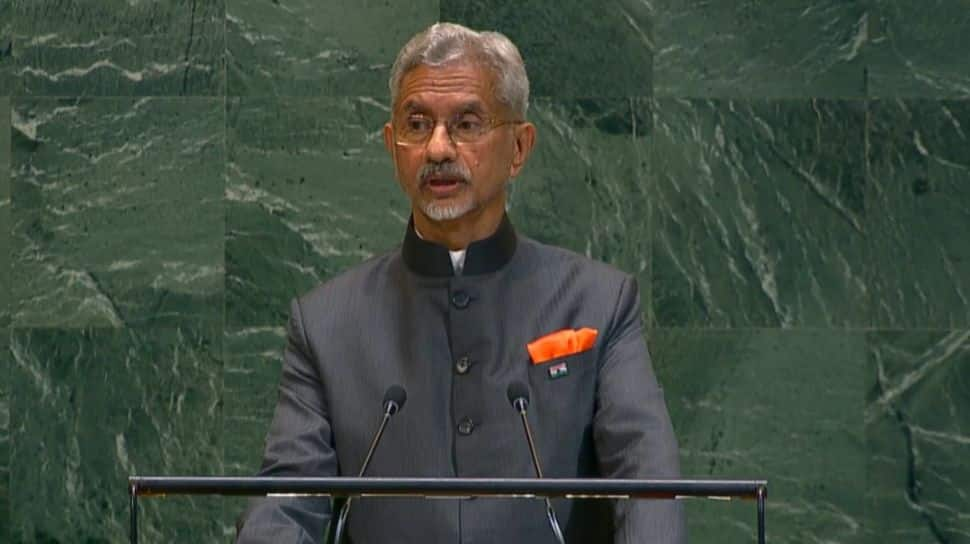Top Stories
India Criticizes Pakistan at UNGA, Calls it Global Terrorism Hub

India intensified its criticism of Pakistan during the recent session of the 80th United Nations General Assembly (UNGA), with External Affairs Minister S. Jaishankar asserting that Pakistan is the “epicentre of global terrorism.” In his address on Saturday, Jaishankar called for the international community to unite against state-sponsored terrorism, underscoring India’s longstanding struggle with cross-border terrorism.
Jaishankar stated, “India has confronted this challenge since its independence, having a neighbour that is an epicentre of global terrorism. For decades now, major international terrorist attacks are traced back to that one country.” He pointed out that the UN’s designated lists of terrorists often include Pakistan nationals. The minister cited the recent April 2023 attack in Pahalgam, Jammu and Kashmir, where 26 tourists lost their lives, as a stark example of the violence stemming from Pakistan.
The minister emphasized the need for deeper international cooperation to combat terrorism, arguing that when nations openly declare terrorism as state policy, it must be condemned unequivocally. He said, “The financing of terrorism must be choked even as prominent terrorists are sanctioned. Relentless pressure must be applied on the entire terrorism ecosystem.” Jaishankar warned that nations that condone terrorism will ultimately face consequences.
India has taken decisive action in response to these threats. Following the Pahalgam attack, Jaishankar highlighted that India exercised its right to defend its citizens and brought the perpetrators to justice. He reaffirmed, “India acted to protect its citizens and ensured that the organisers and perpetrators of the terrorist attack were brought to justice.”
India Responds to Pakistan’s UN Remarks
Earlier in the week, India responded strongly to comments made by Pakistan’s Prime Minister Shehbaz Sharif during his address at the UNGA. Jaishankar characterized Sharif’s remarks as “absurd theatrics,” accusing Pakistan of glorifying terrorism while misrepresenting the India-Pakistan conflict. Sharif had claimed that India engaged in “unprovoked aggression” against Pakistan, a reference to the military operation known as Operation Sindoor.
India dismissed Sharif’s claims as “bizarre” and misleading, noting that Pakistan had previously hosted terrorist mastermind Osama bin Laden for a decade while professing cooperation in global anti-terrorism efforts.
Operation Sindoor Targets Terrorist Installations
In response to the Pahalgam attack, India launched Operation Sindoor on May 7, 2023. This military operation involved precision missile strikes targeting nine terrorist installations across Pakistan and Pakistan-Occupied Kashmir (PoK). Key targets included the stronghold of Jaish-e-Mohammed in Bahawalpur and a base of Lashkar-e-Taiba in Muridke. Indian forces successfully destroyed nine terror launch pads and eliminated over 100 terrorists during this operation.
The ongoing tensions between India and Pakistan continue to pose challenges not only for the two nations but also for regional and global security. As the UNGA discussions unfold, the dialogue surrounding terrorism and accountability remains a focal point for India. The Indian government is steadfast in its commitment to combat terrorism, urging the international community to take a more proactive stance against state-sponsored acts of violence.
-

 World5 months ago
World5 months agoSBI Announces QIP Floor Price at ₹811.05 Per Share
-

 Lifestyle5 months ago
Lifestyle5 months agoCept Unveils ₹3.1 Crore Urban Mobility Plan for Sustainable Growth
-

 Science4 months ago
Science4 months agoNew Blood Group Discovered in South Indian Woman at Rotary Centre
-

 World5 months ago
World5 months agoTorrential Rains Cause Flash Flooding in New York and New Jersey
-

 Top Stories5 months ago
Top Stories5 months agoKonkani Cultural Organisation to Host Pearl Jubilee in Abu Dhabi
-

 Sports4 months ago
Sports4 months agoBroad Advocates for Bowling Change Ahead of Final Test Against India
-

 Science5 months ago
Science5 months agoNothing Headphone 1 Review: A Bold Contender in Audio Design
-

 Top Stories5 months ago
Top Stories5 months agoAir India Crash Investigation Highlights Boeing Fuel Switch Concerns
-

 Business5 months ago
Business5 months agoIndian Stock Market Rebounds: Sensex and Nifty Rise After Four-Day Decline
-

 Sports4 months ago
Sports4 months agoCristian Totti Retires at 19: Pressure of Fame Takes Toll
-

 Politics5 months ago
Politics5 months agoAbandoned Doberman Finds New Home After Journey to Prague
-

 Top Stories5 months ago
Top Stories5 months agoPatna Bank Manager Abhishek Varun Found Dead in Well









